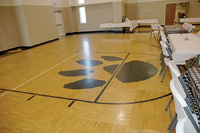21 Aug Layperson’s Code of Conduct
In 1994, we held a leadership conference which brought several hundred UB ministers and laypersons to Huntington, Ind. One morning we divided everyone into groups based on church size–24 different groups. They talked about various issues for a while. Then we further divided those groups in half–ministers and spouses in one group, laypersons in the other. A total of 48 groups. They were instructed to develop a “Code of Conduct” for themselves, one code for ministers, one for laypersons. The 48 codes were then condensed and compiled.
I recently stumbled across those two codes, and was impressed with their wisdom. Here is the “Layperson’s Code of Conduct,” which ended up consisting of 12 points.
- I will be open-minded to change, and will not insist that others follow my preferences.
- I will focus on the positive in our church and convey that to others.
- I will abide in Christ and bear the responsibility of that relationship.
- I will demonstrate a servant attitude in carrying out my church responsibilities.
- I will continuously evaluate my schedule, balancing family and church time in a way which puts family first.
- I will not create conflict, and will lovingly confront those who do.
- I will not criticize the pastor or others behind their backs, but will speak to them personally, always offering a solution with any complaints.
- I will expand my witness in my corner of God’s world, and will do nothing to jeopardize my witness.
- I will recognize that my talents, time, and resources belong to Christ.
- I will be consistent and dependable.
- I will pray for my church, its leaders, and its ministry.
- I will continually remind myself that the ministry of the church is my ministry.

 The
The